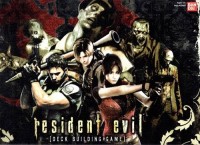
Resident Evil Deck Building Game
Overview
In 1996, Capcom launched a video game for the PlayStation that was an instant hit. Resident Evil created the first “horror survival” video game franchise upon which many other games were spawned (pun intended.) Since that time, Resident Evil has had more incarnations than a mutated DNA strand and now, thanks to Bandai America, a deck-building game. Resident Evil: Deck Building Game (DBG) includes familiar characters and mutations from the video games and packs them tightly into an easy to learn, intense game. But survival is difficult and it all hinges on your ability to build a deck that will allow you to survive “the Mansion.”
Game play
Resident Evil: DBG utilizes familiar mechanics from other deck-builders on the market. So for the sake of time and space, I won’t reiterate them. It’s deck building 101. But, Resident Evil: DBG adds some exciting twists…
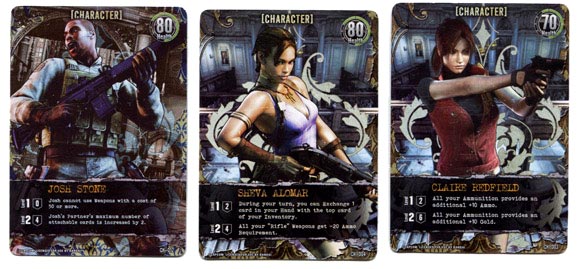
Players first choose a character from the Resident Evil universe (or “REverse” as its called) such as Chris Redfield, Jill Valentine or eight other characters. Each has a different life total, and two special abilities that kick in when that player scores a certain number of points or “Decorations.” This effectively “Levels up” the character and makes them more kick-…um… effective.
Players play cards from their hands that can allow them to take more actions, buy new cards and build their deck. But the action really starts when players whip out their weapons and start blasting the crazed Infected, and to do that, they need to explore the “Mansion.” (Scary music).
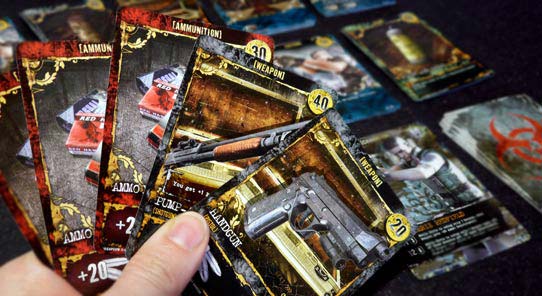
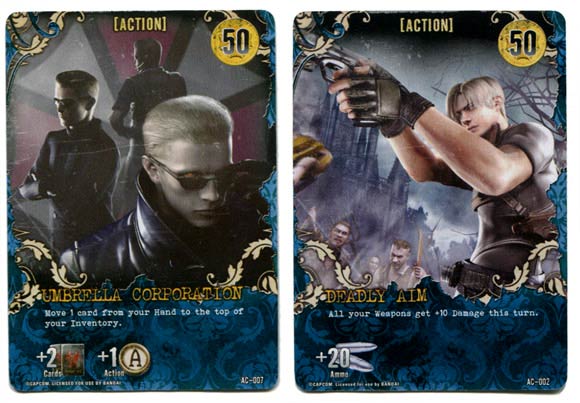
The Mansion is a deck of cards containing all the crazed, flesh eating, mutated humanoids looking for a quick meal… you. Oh, and one ultra-powerful, super-yucky boss named: Uroboros Aheri. To explore, players play their weapons, load them with ammo, and then flip the top card of the mansion deck. If it’s an Infected, you blast it. Kill the thing and score Decorations. Lose, and you lose life depending on how powerful the Infected is. Then the hunger-starved thing creeps back into the Mansion. The Infected vary in power and some have special abilities that can really ruin your day. The game ends when Uroboros Aheri lies in a heap of mutated flesh; no longer a threat. The player with the most Decorations wins!
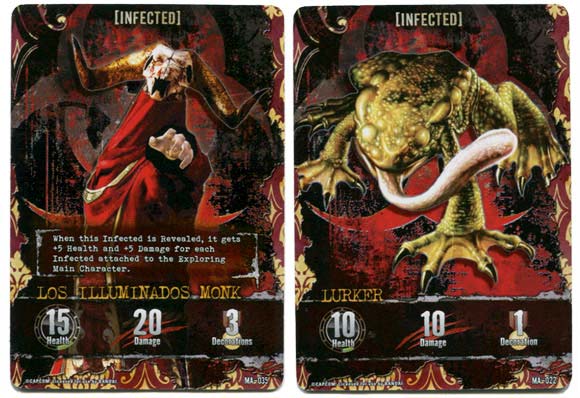
Normally that would be it. Like other DBGs, if you want a different game experience, you choose different card stacks. But designer Tylar Allinder has taken the replay value to a new level and incorporated videogame-like attributes that allow the game to be played in several “modes.” This includes the game mode described above, called “Story Mode.” “Mercenary Mode,” where player must get as many kills as possible before time runs out. And “Versus Mode:” a last player standing free-for-all. Add in several different “Scenarios” that alter the available resources (card stacks) and starting hands, and you have several game variables that provide amazing replay value and a continual challenge.
The result is a game that “feels” like an in-world experience as opposed to a mathematically generated deck-building machine. The intensity rises as the mansion is explored, as time runs out knowing that Uroboros Aheri lies somewhere within waiting for you to come around the corner.
Components
The cards, box, rulebook are great. But the designers of the game must be given accolades for the excellent “graphic art,” that has gone into the game. From the outside of the box to the true-to-the-video-game computer graphic art on the cards, you are immediately pulled into the creepy, untamed world of Resident Evil.
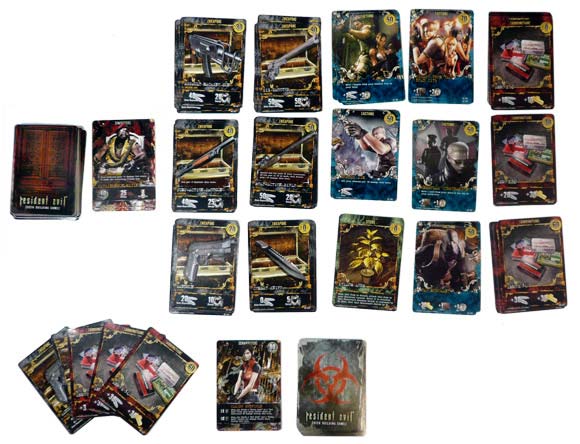
Learning Curve
The use of familiar foundational mechanics makes the Resident Evil: DBG very familiar and the additional options build from these quite elegantly. Easy to learn initially, and easy to augment using the different game modes.
Who would enjoy this game?
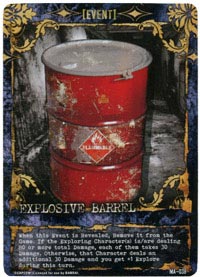
Final Thoughts
Resident Evil: DBG is all about action and immersion. It took very little time to set up and get playing. The game moves quickly (as one would want to do when being stalked by the Infected!) This game offers variable player powers, three modes of play, many scenarios, and with several expansions, the possibilities are almost endless.
I do feel it’s important to comment on the subject matter. The RE video games are very gory, and graphic. This is where the folks at Bandai got it just right. They present the best images and intense action of the “REverse,” without showing every gory detail from the video games. The images are scary, but not too gory. The shooting is suggested. It’s not a family game as I said. BUT, if your kids are over 13, and you share a love of video games, this game can provide some great bonding and may be a good gateway game for teenagers who may think board or card games aren’t that cool. And one last word, the game is filled with strong, mutant-killing female characters: unique in the world of hobby gaming. My teenage daughter thought this was especially cool.
This game is chock-full o’ video game references that RE fans will drool over. It captures the intense theme and vivid atmosphere of the REverse, supported by great art. That is the game’s strongpoint: creepy, tense atmosphere. Sure, there are some small balance issues, but if you want experience-based entertainment and immersion from your deck-building game, look to Resident Evil: DBG.
User Reviews (9)
Add a Review for "Resident Evil Deck Building Game"
You must be logged in to add a review.


You would think the Umbrella Corporation would have learned by now: zombies are bad news. But noooooo, someone always has to play God, and figure that THIS time, their development of zombie bioweapons will work perfectly and they’ll all get rich. Well guess what: it didn’t, and now you’ve got a Mansion swarming with undead on your hands.
In the Resident Evil DBG, players take on the role of one of the characters from the Resident Evil series, and compete to build up an arsenal and clear out the infected from the Mansion before taking on the big boss monster — infected are worth various amounts of “Decorations” corresponding to how tough they are, and the player with the most Decorations when the boss is killed wins. Well, there are several game modes, but this is the one most often played, and the one most relevant to a review.
As a deck building game, your objective is to build your deck, making it a finely-tuned engine of destruction. Your basic card types are Ammunition (your resource), Actions (which let you do special things), and Weapons (which are what you use to attack zombies and get Decorations), as well as Items, which are kind of like Actions and usually remove themselves from your deck on use. Unlike a lot of other DBGs, cards in your deck still cost resources: weapons require a certain amount of Ammo to fire, which is produced by your Ammunition cards in addition to the Gold you use to add more cards to your deck. This means it’s not enough to have enough gold to buy an expensive gun, you have to be able to fire it as well, so Ammunition cards are always required.
There’s also an interesting tension inherent to how you build your deck and play. You can just keep to yourself, making your deck stronger and leaner and more effective by building straight to the more powerful weapons. Or, you can go for weaker but easier to buy weapons, and attack the Mansion earlier — not only will you get points earlier and thus gain a lead, but character cards have abilities that activate when you reach a certain number of Decorations and make them more effective. On the other hand, if you go into the Mansion and turn up an enemy that you don’t have the firepower to kill, it will damage you, possibly taking you out of the game for a round and putting you behind, and as the game goes on and you get more powerful you’re going to spend more time taking the weaker weapons you bought out of the deck again. The decision to play cautious and build up, or be aggressive and go for higher risk and reward, is a tricky one you must make based on your character’s abilities, your opponent’s abilities, and what strategies they seem to be employing.
While it’s fun to go kicking in doors and blowing zombie heads off, especially if you have a group of RE fans who know the characters and monsters, the game does have some notable flaws. In the basic set, only two monsters in the Mansion have over 40 Health, which kind of makes some of the tension in being aggressive vs cautious moot. Some of the characters have versatile abilities that you can choose how best to employ, while others, unfortunately, have abilities that pretty much lock you into one strategy by only working on a certain type of weapon. And some characters are way, way more powerful than others. Adding expansions can solve these problems by introducing more tougher Infected and more characters that are fun to play with. Also, the boss Infected (Uroboros Aheri in this set) is huge, ends the game when killed, does enough damage to kill several characters outright from full health, and is shuffled into the deck like any other normal monster, then REshuffled instead of being placed on the bottom when he comes up and isn’t defeated — you can run into him in the early game, which sucks, and in one game with a friend who had never played before, he ran into Uroboros Aheri three times in a row, killing him every time and leaving him with little to do. He was not eager to play the game again. And the first few turns of the game are quick but boring, with almost everyone going “Buy Ammo x20, your turn”.
Still, it’s a fun game that’s easy to pick up and most of the time runs pretty quickly. If your group contains fans of the Resident Evil series, or folks who want a deck-builder with less castle-building and more zombie-decapitating, definitely give this one a shot.
Dominion was one of the first games to come out with the deck-building format that has since seen several different iterations with various types of games. Each of these games tries to do something different with the format; some succeed, some do not. Enter Resident Evil, a game very similar to Dominion, but unique in its own format that seems to fit very well with the horror genre.
For those who are not familiar with deck-building games, Resident Evil offers the player a chance to play a card game in which you are constantly adding to the deck that you play with, using cards that are available for ‘purchase’ throughout the game. The purpose of this is to increase your chances of completing a certain goal and/or winning the game, as cards that you add to your deck are usually much more powerful and useful than those you start with. In Resident Evil’s case, you’re exploring ‘The Mansion’ with the goal of hunting the infected and taking down the most powerful infected of all, the boss. This infect varies from the base game and the expansion, but in each case, it is high on health and really packs a wollop.
Resident Evil adds some uniqueness to its own variety of play by using character cards which have varying statistics that the player selects for their own role in the game. Each character card also has a level chart (two potential levels per character) printed on the card. As you kill monsters, you achieve that level gradually and become more effective in your quest to kill the boss.
Of course, since this is survival horror, you’re going to take your hits in this game. And characters CAN die. It takes a while, but it is possible. If your character card is reduced to zero health, that character is mortally injured and loses a turn recovering. When recovering, the character is restored back to maximum health, but their maximum health is reduced by 20 each time they die. So for instance, if your Leon Kennedy has 80 health and dies once, when he recovers, he will have 60 maximum health. The next time he dies, he will have 40 health. And so on. If a character’s maximum health is reduced to zero, he or she is dead, and the player is out of the game. There are healing items available to use…but of course, you’ll need to buy them and put them in your deck before you can use them.
A player starts out with 7 ammo cards, two knives, and a gun in their deck. Ammo cards have a dual purpose in this game; they power your weapons (at least the ones that require ammo to use), and they count as gold to use to buy cards. There are three varieties of ammo; ammo that counts as 10 ammo and gold, ammo that counts as 20 ammo and gold, and ammo that counts as 30 ammo and gold. To start, you only have the 10 ammo/gold variety. As you play, you buy cards from the weapons and action piles, and/or more powerful ammo. Those cards go to your discard pile, and eventually get shuffled back into your deck to be used on subsequent turns. As you play, your deck gets bigger, and your resources get more plentiful.
Each player gets one action, one buy, and one explore on their turn. With their action, a player can play an action card from their hand if they have one. With their one buy, a player can purchase a card. And with their one explore, a player can draw a card from the Mansion deck and encounter what they drew. Sometimes it’s a monster, sometimes it’s a special item, and sometimes it’s the boss. You just never know until you explore. It should be noted that in the original printing of the rules, you HAD to explore once every turn. This made for a very brutal game. Since then, the expansion has allowed for the option to explore, which makes the game easier since you can pick and choose your moments.
When a player explores the mansion, they need to place the weapon(s) down that they are going to use if they encounter a monster. If it’s a gun, ammo needs to be provided to power a gun. A gun can only be used once during an explore, even if you have enough ammo to shoot it twice. However, any number of weapons can be used. If a monster is exposed, then combat ensues. If the player has enough damage in their weapons to meet or beat the monster’s health, it is defeated and added as a ‘decoration’ to the character’s card (decorations are what enable level progression). If the player can’t beat it, the character card takes damage according to the damage rating on the monster. It then goes to the bottom of the deck to eventually be encountered again. Once the boss is encountered (and beaten), the game is over, and all players add up their decorations to determine who the winner is of the game.
Resident Evil has a lot to offer, and does it well. There are multiple sets of cards in the game, and the instruction booklet includes examples of variants that you can play. You can also choose random cards for a completely open scenario and give this game a whirl. There are even options for team play, and a mercenaries mode as well, with different rule sets. You can adjust the difficulty of the game with ease by using variant or house rules, so it never feels like the game is really being unfair. And if it feels like the boss is too overpowered, the game has the kindness to add the Rocket Launcher, a weapon capable of destroying any monster in the game with one hit. You can’t purchase this weapon; you can only find it in the mansion by exploring. But when you have it in your hand, you PRAY that the boss is just around the corner.
One of the main strengths of Resident Evil (and in my opinion, what makes this game a winner) is that it has the capability to be played solo. You have just one main goal; take down the boss before you die. When you play this style, I would advise playing the rule that you have to explore every turn. Beating the game with this handicap is a real accomplishment, and truly adds a sense of survival to the game. The challenge is definitely there, and coupled with the fantastic art of the game, the replay factor of the game, and the simple mechanics, you will truly get your money’s worth out of this title.
It’s natural to have several thousand red flags whenever you see a video game spin off of any form; after all, great video games typically make lousy toys, cartoons, cereals and movies. I think that Resident Evil is an exceptions to the rule.
The game is fun, easy to learn, and moves along quickly. You buy action cards, build a deck using gold, and try to gather as many points as you can by the end of the game. Ok I’ll admit that instead of buying a witch or a village you might buy be buying say, an automatic shotgun, but basically it’s your typical deck builder.
The biggest and most exiting differences is the addition of the Mansion Deck. In order to gain points you have to enter the mansion and face infected zombie hordes. You never know what infected creature you’re going to flip over and whether or not you’re going to get your butt handed to you.
Another fun addition is that each player plays a different character with different abilities. Finally and perhaps most interesting of all you can play this game in a few different modes: players vs. zombies, player vs.player, or in teams vs. other teams.
On the negative side the cards are really hard and confusing to put away and game cleanup can be a pain-inzaboot. If you like deck building, like Dominion, but want something a little lighter in game mechanics and a bit more action oriented I think this game would make a nice addition to your gaming shelf.
JacobRomeo
I was played this game and I don´t think that it could be defined as a strategy game due the lucky factor.
The main way to win force you to explore between the monsters and there are randomly arranged since the begining of the match so this means that you could find the biggest monster at the begining, this could be an issue for a power gamer because you could expend a few turns trying to get the best cards to pass over the monsters and in the same time other player with just lucky, could beats the first weakest monsters even without the better cards.
In a general way to make a review, the game provide enough fun if you play it as an avid gamer.
If you like the franchise you will like this game as well. It is a bit rough for the new deck builder, but is a good challenge for the old pro. We used to find the game play a bit slow at our store but once we figured out the starting purchase patterns it has sped up a lot. We are now making home brew variations to the game and things have become a lot more interesting. Not everyone will love this game. It is in general a slower starting deck builder game because of the fact nobody has to go in and fight the infected unless they want to. Game variations can fix this issue. And as we in the store like to say “It’s OK to die!” If we hear this chant and did not know before, we now know somebody is playing Resident Evil.
I never played the video game. I have no idea who the characters are in this game. Resident Evil is based on that video game, bring the (well-known) characters into the deck building genre. And, in my humblest of opinions, does so very well.
At first, it seemed…..OK. A fun game, but nothing really out of the ordinary. Then — Wham! We’re literally getting nervous exploring the mansion. We’re frantically trying to come up with the right hand in order to beat the big baddie….wherever he is in the mansion deck.
This game grabs you unexpectedly. It draws you in slowly, with an insidious calm that hides a taught quest of survival. And if you do happen to die? Well, like in a video game, you come back for more…only with less hit points than before. Die and again and, well, you die.
The main game has a limited number of cards, meaning limited replay. But with one or two expansions, you have a game with a ton of replay value that both entertains and makes the hair on the back of your neck stand up. A great alternative to the deck building genre.
Resident Evil – The Deck building game. While the rules manual was a little hard to follow due to bad wording and formatting (which I believe is being fixed in the second printing of the game) the game is pretty easy to pick up and learn even if you have never played a deck building game before. The cards art is nice using graphics from the games and they all fit nicely back into the box in the custom tray making it easy for set up.
The game has 3 modes, which keeps play interesting and with multiple starting set-ups it can really change the way each player builds their deck. If you are a fan of Resident evil, Zombies or Deck building games this is a good one to have in your cupboard
Has Dominion like mechanics mixed with Munchkin room searching. With this game you don’t get board easy. The action moves along and the versatility is top notch. Nothing like going into the rooms guns blazing against vicious zombies. Or, battle each other with the weapons and gear. Its always a good time!
I was not to hot about deck building games even when I played Dominion, but when I played Resident evil I got hooked with 3 game modes plus the few I created this game has a lot of replay value.
With games like dominion and thunderstone this game is easily overlooked but if you like the deck building genre you should give this one a try